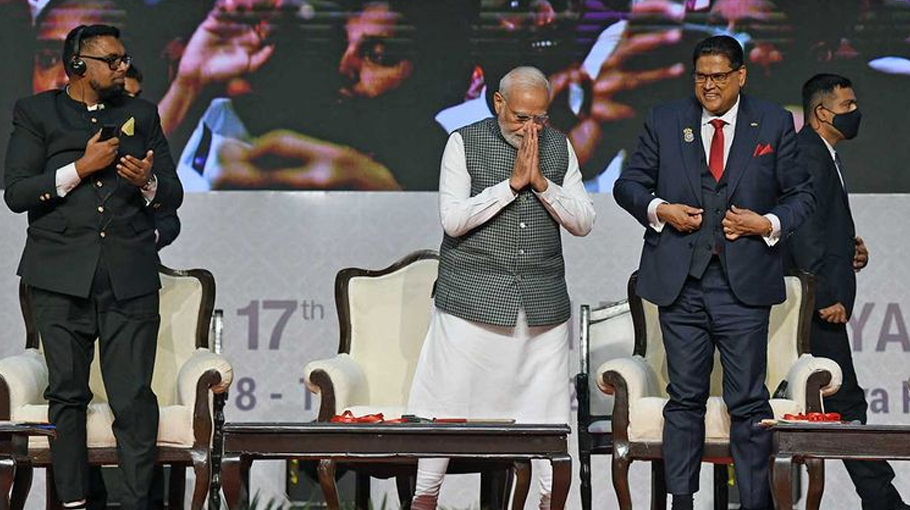Celebrating diaspora during India’s G20 presidency

The Indian diaspora, in its widest sense, is over 30 million strong, with over 18 million of these having been born in India. It is spread across the world in over 200 countries.
It is, moreover, a growing global population, with some 2.5 million leaving our shores for foreign lands, mostly in search of better educational or work opportunities.
The largest numbers are in North America, with the United States and Canada together accounting for over 6 million overseas Indians.
Estimates vary, but according to Indian government sources, other countries with sizeable Indian populations include United Arab Emirates (3,425,145), Malaysia (2,987,950), Saudi Arabia (2,594,950), Myanmar (2,009,207), and United Kingdom (1,892,000).
Countries which comprise a high percentage of Indians include Mauritius (65.06%), UAE (42.1%), Guyana (39.83%), Qatar (39.5%), Trinidad and Tobago (35.4%), Fiji (34.42%), Réunion (31.42%), Suriname (27.4%), Saudi Arabia (23.22) Kuwait (22.5%), and Bahrain (21%). All of these have over 20% of the population made up of Indians.
In addition, significant and influential Indian populations live in countries as geographically spread out and apart as Saint Vincent and the Grenadines (19.7%), Oman (16%), Nepal (14.7%), Guadeloupe (13.6%), Grenada (11.7%), Seychelles (10.48%), Martinique (10%), Singapore (8.3%), Malaysia (7.4%), Sri Lanka (5.4%), Canada (5.1%), Brunei (5%), New Zealand (4.7%), Jamaica (3.4%), Australia (3.1%), Myanmar (2.50%), South Africa (2.40%), United Kingdom (1.8%), United States (1.3 %), and Kenya (1.13%).
It was only 20 years ago that the Indian government decided to officially honour and reconnect this vastly significant population to the motherland. The credit for initiating the Pravasi Bharatiya Divas (PBD) should go to an earlier Bharatiya Janata Party Prime Minister, Atal Bihari Vajpayee. January 9th was chosen because this was the day Mahatma Gandhi returned to India in 1915 after spending over twenty years in South Africa.
Since then, the PBD Convention has been the “flagship event” of the government “to engage and connect with overseas Indians and enable the diaspora to interact with each other.”
The17th PBD Convention was held in Indore this year. Prime Minister Narendra Modi began by emphasising the cultural and religious significance of Madhya Pradesh and Indore, even praising the latter’s famed “Indori Namkeen” or savouries.
The theme for this year’s Convention was “Diaspora: Reliable partners for India’s progress in Amrit Kaal.” Over 3500 delegates from some 70 countries registered to participate.
The Chief Guest was Dr Mohamed Irfaan Ali, the President of the Cooperative Republic of Guyana. Ten years ago, in 2013, the PBD Chief Guest was also then President of Guyana, Donald Ramtar.
This year’s guest of honour was Republic of Suriname President Chandrikapersad Santokhi.
Ambassadors of the nation
Indian Prime Minister Narendra Modi released a commemorative postal stamp, “Surakshit Jaayen, Prashikshit Jaayen,” which means go protected and well-qualified.
True to his style, he brought in technology to augment the Convention theme by inaugurating a first of its kind Digital Exhibition highlighting the contribution of Diaspora to India’s Freedom Struggle.
This was quite befitting the on-going India@75 celebration, “Azadi Ka Amrit Mahotsav.” The PBD Convention concluded on Monday after an impressive ceremony in which Prime Minister Narendra Modi himself addressed the gathering.
Modi said that India’s diaspora constituted our best brand ambassadors: “I call all diaspora Indians as the brand ambassadors of India. You all are ‘Rashtradoots’ (ambassadors of the nation). Your role as India’s brand ambassadors is diverse: you are brand ambassadors of Make in India, Yoga, Handicraft industry, and of India’s millets.”
He added, “The idea of Vasudhaiva Kutumbakam—or the whole world as one family—was evident in overseas Indians.”
Perhaps, no other Indian leader has worked harder to build ties with overseas Indians than Modi. His support, one might even call it fan following, among Indians abroad is legendary. It can fill large stadiums, as in the Howdy Modi event in Houston, Texas, in September 2019.
US President Donald Trump and Modi did an unforgettable victory lap together, with an ecstatic and cheering audience made up of influential Indo-Americans, US Senators, Congressmen, and other dignitaries. I was witness to this amazing event, with its electric energy and unforgettable atmosphere.
Recognised by homeland
During PBD 2023, Modi stressed India’s global role during its presidency of G20: “India’s voice is being heard on the global stage. India is also the host of this year’s G20. We do not want to make it only a diplomatic event, but an event of people’s participation.” Modi was also quick to stress India’s demographic dividend, the contribution of a skilled and young population to the world of the 21st century: “Our youth has skills, values, honesty and determination toward work. Our skilled capital can become the world’s growth engine.”
Modi was right in remarking that the eyes of the world are on India. India is not just an object of curiosity but of admiration, albeit sometimes grudging: “The world is interested in India’s speed and scale. They are interested in India’s future. When it comes to a cashless economy, the world is surprised to see that 40 per cent of the world’s Real-Time Digital transactions take place in India.”
Modi invited the Indian diaspora to contribute not to India’s “Amrit Kaal” or ambrosial age, but also to the new world order which is emerging before our eyes.
Both the old diaspora of labour and the new diaspora of technology and capital should be welcomed and recognised by the homeland.
In keeping with such a principle, this PBD’s surprise awardee of the highest government recognition, Pravasi Bharatiya Samman, to a member of the Indian diaspora was US billionaire Darshan Singh Dhaliwal, who supported the year’s farmer’s agitation by providing free food to the protesters.
This shows that the government does not wish to bear grudges but move ahead in the process of healing and reconciliation, especially important in a sensitive border state such as Punjab.
Makarand R. Paranjape is a Professor of English at the Jawaharlal Nehru University.
Views are personal.
Source: Gulf News



